Through research, Mr. Ho Dien Qui (village 7, An Phu commune, Pleiku city) learned that people in provinces such as Dak Nong and Lam Dong use passion fruit peels as feed for cows. After testing, Mr. Qui was happy to see that the cows grew and developed well, significantly reducing the cost of buying feed for the cows. Mr. Qui analyzed: In 5 days, each cow ate 6 rolls of straw (about 35-40 thousand VND/roll). Also during this period, each cow ate 1 ton of passion fruit peels but only spent 30 thousand VND.
Notably, the cows fed passion fruit peels are plumper and grow faster than those fed straw and grass. Realizing that this agricultural by-product is truly a “gold mine” for alternative feed, Mr. Qui has switched to feeding his cows exclusively with passion fruit peels since 2020.
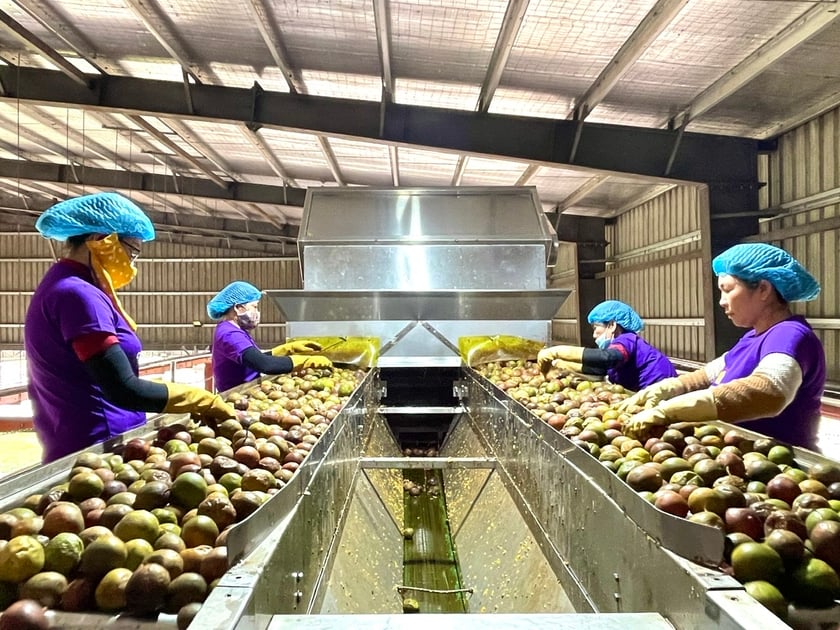 |
The Quicornac factory has created stable jobs for more than 200 workers, many of whom are local ethnic minorities. Photo: MN |
Currently, on average, Mr. Qui orders about 10 tons of passion fruit peels from Quicornac Company Limited every day to feed his family's herd of more than 40 cows and to supply to 10 households raising cows near his house (each household raises 5-10 cows). "If there were no source of passion fruit peels, I would only raise about 10 cows because raising so many would not be able to bear the cost of feed and land for growing grass. Since having a stable supply from the factory, cow farmers have had less trouble and have also benefited a lot. Some people even combine passion fruit peels with bran to fatten cows or use lemon peels as feed for wild boars, compost black flies to feed chickens, and make fertilizer for grass," Mr. Qui said about the versatility of passion fruit peels.
Like Mr. Qui, every day, Mr. Vo Hung (village 6, An Phu commune) arrives at the gate of Quicornac Company very early to buy passion fruit peel. His family raises 10 cows, each day they eat 1 ton of passion fruit peel, which costs 30 thousand VND. According to Mr. Hung, the passion fruit peels just need to be piled up for the cows to eat. If there are a lot, they can be covered with a tarp, and after 10 days or half a month, they can be fed to the cows, which is better than when they first bought them. Because the company leaves the fruit whole and squeezes out the juice, it has to go through many processing steps from dry washing to water washing, so the passion fruit peels here are very clean, and the cows can eat them hygienically.
Mr. Hung analyzed: “Raising cows with passion fruit peel is many times more profitable than feeding them grass or straw. In the past, I raised 3-4 cows and my hands were tired from cutting grass, now raising 10 to 20 cows is normal, some families raise 100 cows and feel very healthy. That is why cow breeders in Pleiku, An Khe, Mang Yang, Dak Doa and even Kon Tum have registered to buy passion fruit peels from Quicornac Company Limited.”
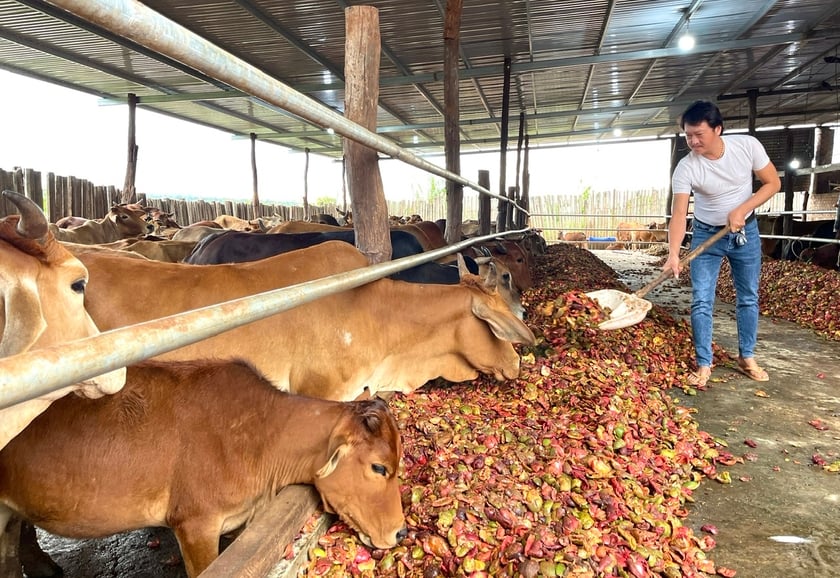 |
On average, each month, Mr. Nguyen Van Khiem (Ngol village, Dak Doa town) buys about 300 tons, sometimes up to 450 tons of passion fruit peel to feed his cows. Photo: MN |
Meanwhile, Mr. Nguyen Van Khiem's cattle farm (Ngol village, Dak Doa town) always fluctuates between 350 and 400 cows, so the daily food demand is very large. For nearly 2 years now, he has registered to buy lemon peels from Quicornac Company Limited to use as feed to fatten cattle and beef cattle. Each month, he buys about 300 tons, sometimes up to 450 tons. Compared to straw and grass, using passion fruit peels as feed for cows is more effective. Not only does the cost of feed decrease by more than half, but the cows also grow quickly, the red meat is very beautiful, and the meat quality also increases.
Mr. Khiem said: Previously, he planted 5 hectares of grass but only had enough food for about 70 cows. Since using lemon peels as food, he has boldly expanded his farming scale to what it is today. Now, the cows only eat passion fruit peels. For the newly purchased cows for fattening, he gives them grass and bran for a few days to get used to it and then switches to lemon peels. To maintain this stable food source, in addition to signing a purchase contract, he also has to comply with strict regulations to ensure the Company's environmental hygiene.
“The vehicle transporting passion fruit peel from the factory must be covered with a tarpaulin to prevent water from leaking or lemon peel falling onto the road; the driver must not violate the alcohol concentration, and must pick up the goods in order... If there is a violation, the Company will terminate the contract,” said Mr. Khiem.
Mr. Nguyen Hoang Gia Anh's farm (Binh Giang village, Hneng commune, Dak Doa district) also raises more than 100 cows fed with passion fruit peel. Mr. Nguyen Hoang Gia Anh affirmed: "The source of passion fruit peel has helped farmers boldly expand their scale. More than 90% of farmers here use passion fruit peel as feed for their cows. The price is only 30,000 VND/ton and the supply is also abundant. Without this source of food, no one would dare to raise many cows."
Towards circular agriculture
According to Mr. Nguyen Van Linh - Head of the by-product management department of Quicornac Company Limited: The Company's goal is to achieve optimal efficiency in the production value chain, especially not to let production and business activities affect the environment. Production reality shows that the factory generates a very large amount of agricultural by-products, which are passion fruit peels. Meanwhile, passion fruit peels have a very high water and nutrient content, and can be used in processing animal feed and producing biofertilizers.
To realize the circular agricultural chain, the Company has deployed the supply of passion fruit peel by-products to cattle farms in Gia Lai province and neighboring provinces; at the same time, cooperated with units to research on composting organic microbial fertilizers. The Company's transfer of passion fruit peel by-products to direct production facilities as livestock feed ingredients meets the provisions of Point a, Clause 1, Article 82 of the Law on Environmental Protection.
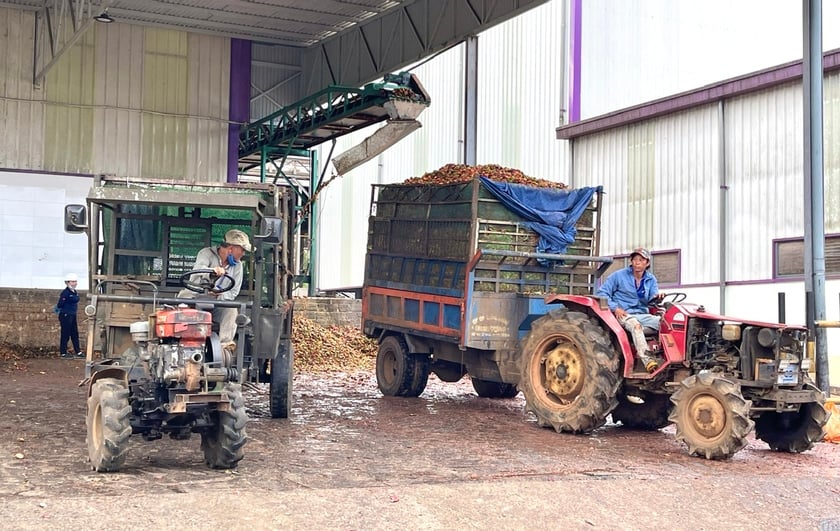 |
Vehicles transporting passion fruit peels from the factory must ensure environmental hygiene, be covered with tarpaulins, and not let water or lemon peels fall onto the road. Photo: MN |
Mr. Nguyen Van Linh - Head of the by-product management department of Quicornac Company Limited: "To ensure that the factory's passion fruit peel by-products are used for the right purpose, the Company has signed a supply contract and has commitments from farms and farmers to use passion fruit peel for the right purpose. During the operation process, the Company also regularly checks and supervises the use of passion fruit peel by its partners. On the other hand, the Company strengthens training on composting techniques, regularly checks and supervises composting partners to ensure proper technical practices to produce quality compost products without affecting the environment."
The Head of the By-product Management Department of Quicornac Co., Ltd. said: Since mid-2022, the Company has conducted communication, training and signed contracts to supply passion fruit peel to cattle farms. The farms have clearly seen the absolute benefits of using passion fruit peel as feed for cattle. This farming method helps farmers save significant costs and time compared to planting, caring for and harvesting grass. In addition, this is also a nutritious food source, helping cows grow well, bringing high economic efficiency to farmers.
According to research by the Institute of Biotechnology and Environmental Science, passion fruit peel is also used in the production of biofertilizers. After testing fermentation and successfully producing high-quality biofertilizers, Quicornac Company Limited conducted training on biofertilizer composting techniques, and collaborated with farms and households in the area to transfer biofertilizers from passion fruit peel to serve agricultural production, helping to reduce the use of chemical products and contribute to improving the soil environment.
Notably, since May 2023, the Company has coordinated with the Institute of Biotechnology and Environment to successfully deploy a model of processing passion fruit peels into organic materials for the production of microbial organic fertilizers using the technology and equipment of Dr. Le Van Tri - Chairman of the Board of Directors, General Director of Fitohoocmon Biotechnology-Fertilizer Joint Stock Company, Chairman of the Vietnam Biofertilizer Association.
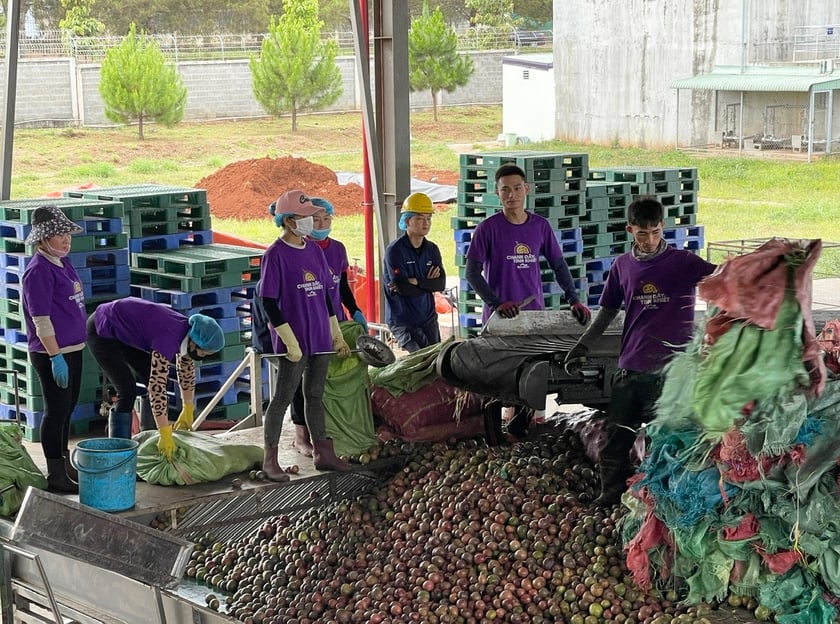 |
Workers process passion fruit raw materials. Photo: MN |
According to Mr. Linh, Dr. Le Van Tri is a leading expert in the field of production of organic microbial complex fertilizers with a wide technology transfer system to more than 50 provinces and cities nationwide. The transferred technologies and biological products researched nationwide are all included in national-scale projects. For example, topics on biological fertilizers to develop organic agriculture, topics on processing straw into biological fertilizers in the National Straw Treatment Program, topics on tray seeding for manual and machine planting towards mechanization and modernization of agriculture...
“The company coordinated to process nearly 3,500 tons of passion fruit peels, creating 1,500 tons of good quality organic humus, high organic matter and nutrient content, heavy metal content and microbial density below the allowable threshold, so it is safe for soil and plants, suitable as raw material for the production of organic microbial fertilizers. The quality of the fertilizer produced has been initially surveyed and highly appreciated on coffee and rubber trees in the basic construction stage in Gia Lai and Dak Lak provinces,” Mr. Linh informed.
Source








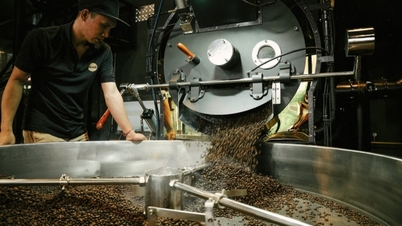

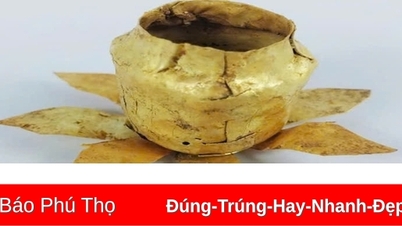


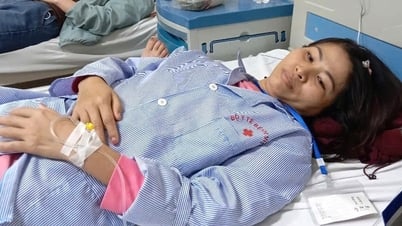

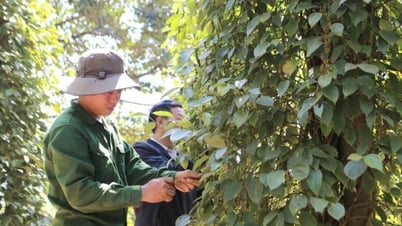
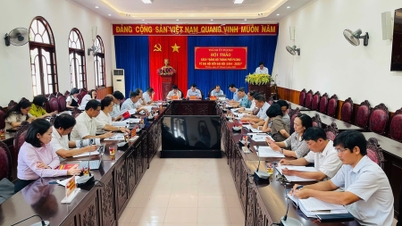
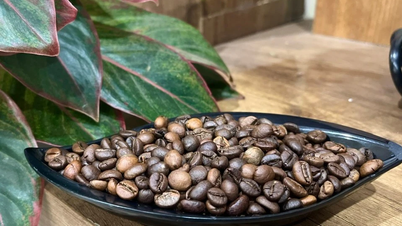

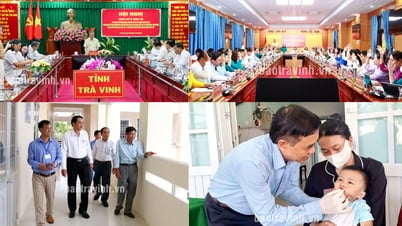

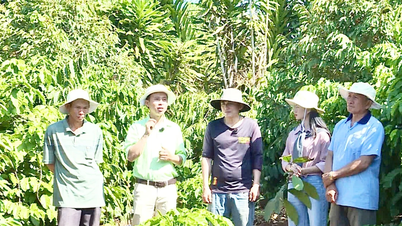

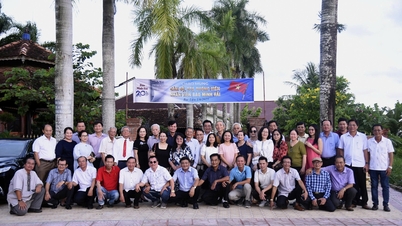







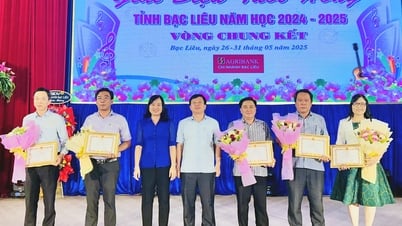
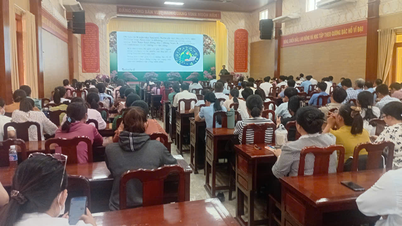











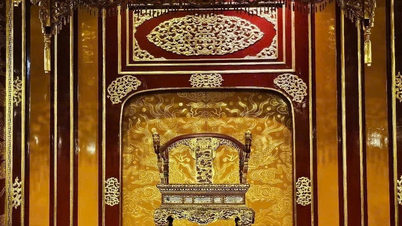











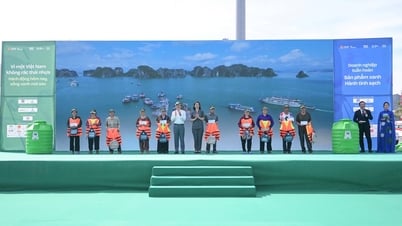



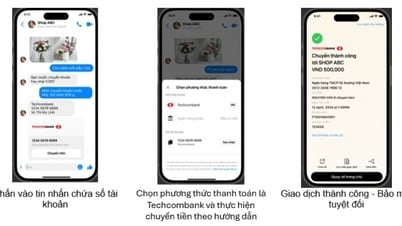






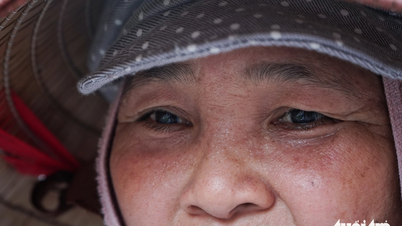

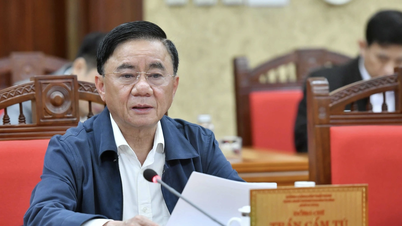




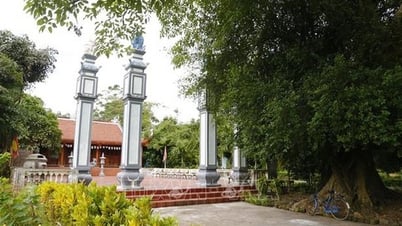


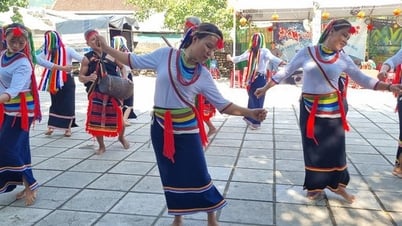


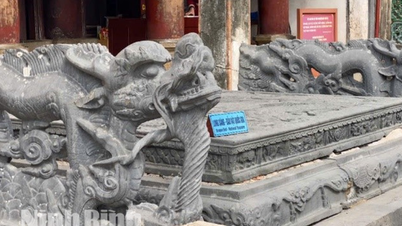
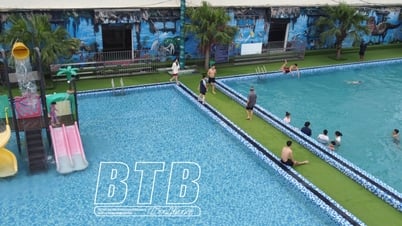

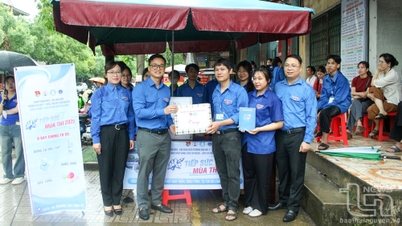

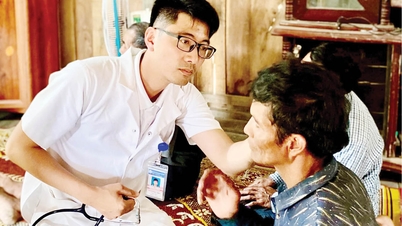















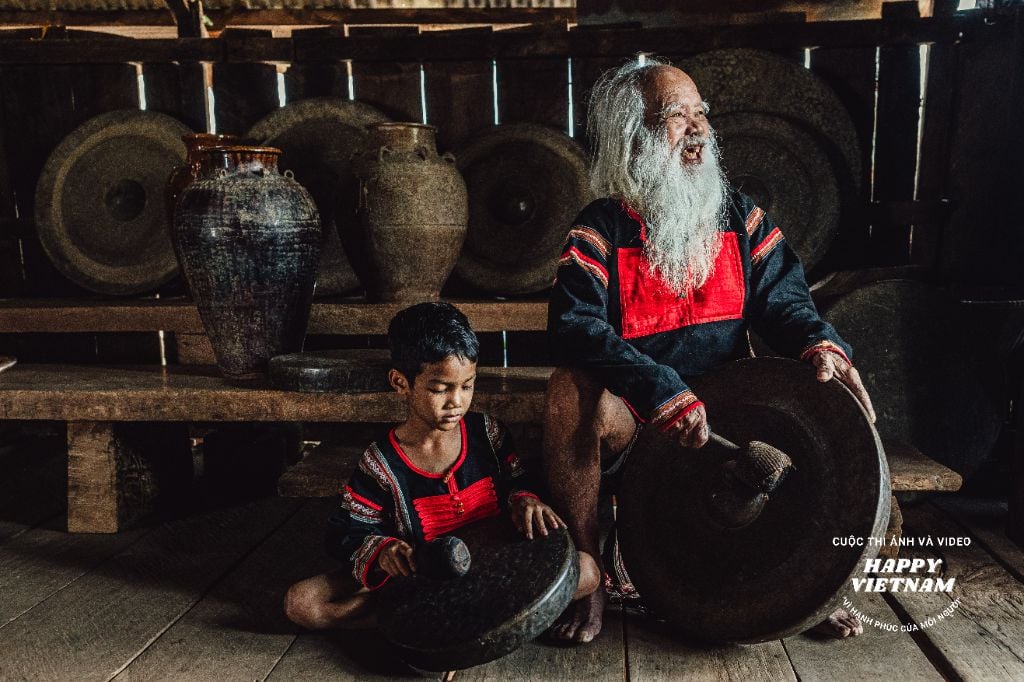
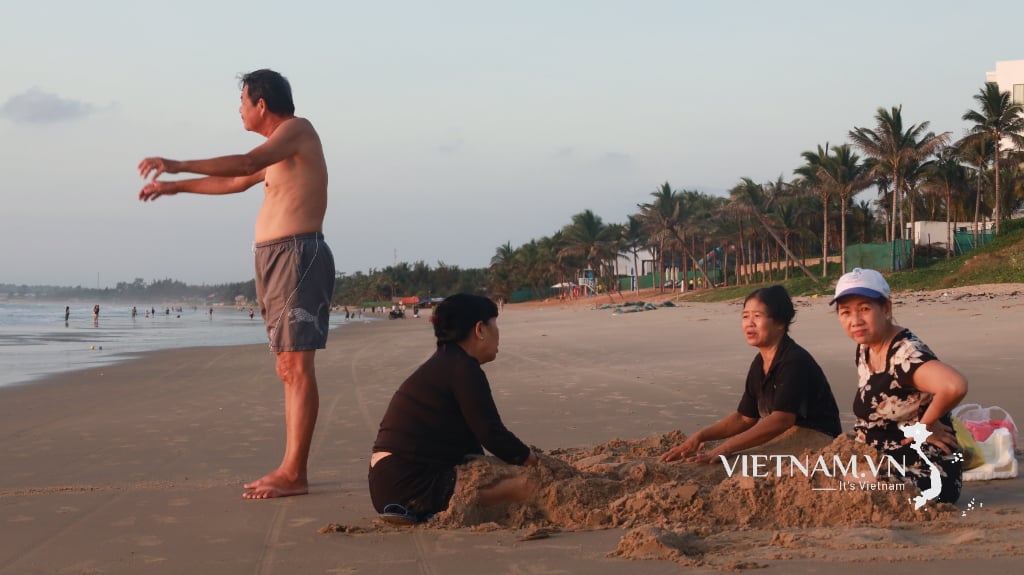

Comment (0)